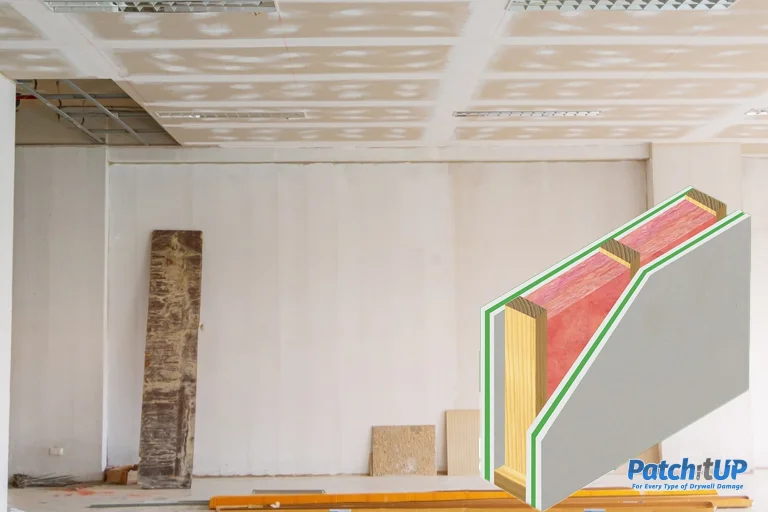Living in a world of noise, a quiet space in your home can be a precious commodity. Whether you’re a musician yearning for a practice room, a movie buff seeking a dedicated home theater, or simply someone who desires peace and tranquility, soundproofing your home becomes a top priority.
Drywall, the ubiquitous wall material in most homes, offers some soundproofing, but it’s far from perfect. Soundproof drywall provides a solution to creating a quieter, more serene space.
What is Soundproof Drywall?
Standard drywall consists of a gypsum core sandwiched between paper facings. While offering some sound reduction, its rigid structure readily transmits sound waves. Soundproof drywall, called sound-dampening or acoustic drywall, takes a different approach.
These panels contain a special inner core made from gypsum, viscoelastic compounds, and sometimes even ceramics. This unique composition disrupts sound waves, offering superior soundproofing to traditional drywall.
Does Soundproof Drywall Work?
Soundproof drywall is more effective at blocking sound than regular drywall. It achieves this by addressing two key aspects of sound transmission:
Mass:
Soundproofing materials with higher mass are better at blocking sound waves. Soundproof drywall’s unique core adds significant mass compared to standard drywall, making it a more formidable barrier.
Damping:
Certain materials absorb sound wave energy, reducing their transmission. The viscoelastic layer in soundproof drywall acts as a damper, absorbing sound energy and diminishing its travel through the wall.
However, it’s essential to understand that soundproofing is a multi-pronged approach. While soundproof drywall significantly improves sound insulation, it’s not a magic bullet. Here’s why:
Sound travels through various paths:
Walls are just one element. Sound can also flank through ceilings, floors, and gaps around doors and windows. A comprehensive soundproofing strategy needs to address all these areas.
STC Rating:
Sound Transmission Class (STC) is a standard that measures how well a wall assembly blocks sound. Higher STC ratings indicate better soundproofing. While soundproof drywall offers improved STC ratings compared to regular drywall, it may not achieve complete soundproofing, depending on your desired noise reduction level.
Considering Soundproof Drywall for Your Home?

Soundproof drywall can be a valuable tool if you want to create a quieter space in your home. Here are some factors to consider:
- Type of soundproofing needed: Are you trying to block low-frequency noise like traffic rumble or high-frequency sounds like music? Different soundproofing methods are better suited for various noise types.
- Existing wall construction: Adding soundproof drywall requires modifying your wall structure. Consider if this aligns with your project scope and budget.
- Soundproofing materials: In addition to soundproof drywall, materials like mass-loaded vinyl (MLV) and acoustics can further enhance soundproofing.
- Professional installation: Soundproof drywall installation is similar to regular drywall but requires a more meticulous approach to maximize effectiveness. Consider consulting a professional contractor experienced in soundproofing projects.
Alternatives to Soundproof Drywall
Soundproof drywall is a great option, but it’s not the only way to achieve a quieter space. Here are some alternative methods to consider:
- Double or triple layering regular drywall: While not as effective as soundproof drywall, adding additional layers of standard drywall can improve sound insulation.
- Soundproofing insulation: Filling wall cavities with sound-absorbing insulation like fiberglass or mineral wool can improve soundproofing.
- Sound-dampening materials: Adding sound-dampening materials like acoustic blankets or decoupling membranes to existing walls can help reduce sound transmission.
- Door and window upgrades: Upgrading doors and windows to denser, more soundproof options significantly impacts soundproofing effectiveness.
Final Thoughts
Soundproof drywall offers a powerful solution for creating a quieter space in your home. By understanding its properties and limitations and considering alternative methods, you can create a soundproofing strategy that meets your needs and budget. Soundproofing is a holistic approach mass-loaded vinyl potential sound paths are crucial for achieving a truly soundproof room.
PatchitUP offers professional insulation services that can be a valuable addition to your soundproofing strategy. They can assess your needs, recommend the right insulation materials, and ensure proper installation for optimal noise reduction.
FAQ’s
Q. Is soundproof drywall soundproof?
A. Soundproof drywall is more accurate than sound-dampening drywall. While it significantly reduces sound transmission compared to regular drywall, it won’t completely eliminate noise. Completing soundproofing requires a comprehensive approach addressing walls, ceilings, floors, windows, and doors.
Q. What is the STC rating of soundproof drywall?
A. STC ratings vary depending on the specific product and installation method. Generally, soundproof drywall offers STC ratings in the mid-40s to upper 50s, compared to the low to mid-30s of standard drywall. The higher the STC rating, the better the sound-blocking performance.
Q. Can I install soundproof drywall myself?
A. While the installation process is similar to regular drywall, meticulous attention to detail is crucial to maximize soundproofing effectiveness. Consider consulting a professional contractor experienced in soundproofing projects, especially for complex applications.
Q. What are some alternatives to soundproof drywall?
A. If soundproof drywall isn’t ideal for your project, several alternative methods can help achieve a quieter space. These include adding layers of regular drywall, using soundproofing insulation in wall cavities, applying sound-dampening materials to existing walls, and upgrading doors and windows to denser, more soundproof options.
Q. Is soundproof drywall expensive?
A. Soundproof drywall is generally more expensive than regular drywall due to its material composition and potentially more complex installation process. However, the cost is justified by the significant improvement in soundproofing performance. For a budget-friendly approach, consider combining soundproof drywall with alternative soundproofing methods.


Leave a Reply